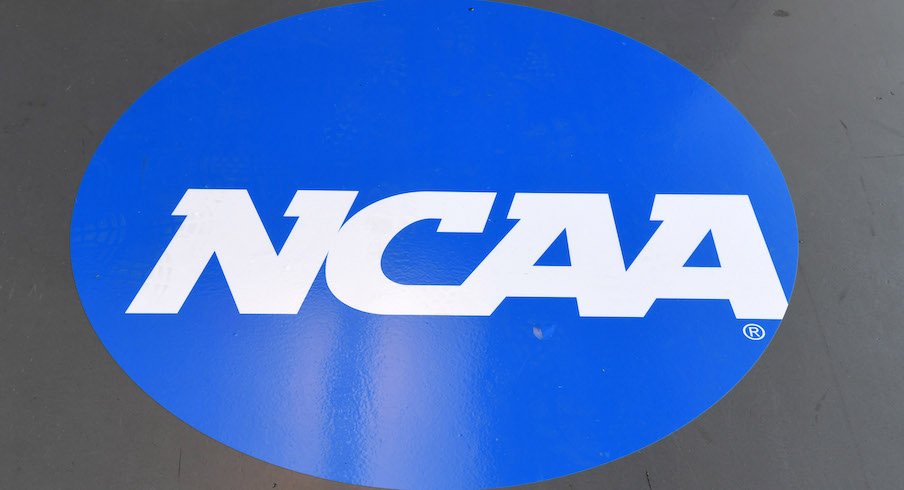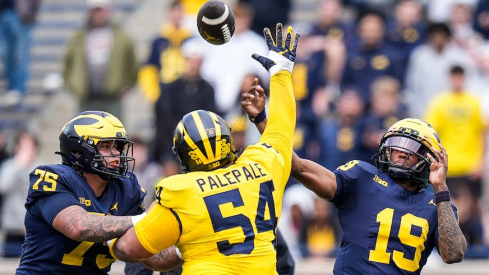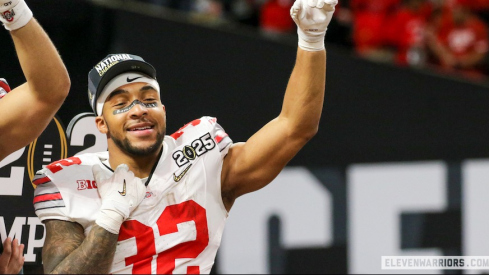NCAA athletes are one step closer to being allowed to profit from their name, image and likeness.
The NCAA announced Wednesday that its Board of Governors supports rule changes that, if approved by the NCAA's full membership, will allow student-athletes to profit from their fame and receive compensation for third-party endorsements both related to and separate from athletics, as well as social media, digital content creation, personal businesses, appearances and autograph signings.
Per the recommended new rules, which were developed by a working group co-chaired by Ohio State athletic director Gene Smith, the NCAA would allow student-athletes to be paid for promotional opportunities, student-athletes will be allowed to identify themselves by their sport and schools but cannot use any school logos or trademarks. They will also be required to disclose all sponsorships to their schools, as well as their relationships with any individuals involved in those sponsorships.
The NCAA is expected to vote on the proposed rule changes in January 2021, so the new rules would go into effect for the 2021-22 academic year. The current model prohibiting student-athletes from being paid for name, image and likeness benefits will remain in place until then.
Under the timeline proposed by the working group's recommendations released Wednesday, legislative proposals are expected to be drafted by the NCAA's Division I, II and III by August 30, reviewed and revised by October 31 and approved by January 31.
“The NCAA’s work to modernize name, image and likeness continues, and we plan to make these important changes on the original timeline, no later than January 2021,” Smith said in the NCAA's announcement. “The board’s decision today provides further guidance to each division as they create and adopt appropriate rules changes.”
During a teleconference on Wednesday, Smith said there will be no cap placed on the total amount of money a student-athlete can earn from name, image and likeness benefits, though the NCAA is working to determine what constitutes fair market value in order to regulate what allowable benefits should be.
Student-athletes will be allowed to consults with agents and advisors to help them pursue promotional opportunities, but those agents will not be allowed to help them pursue professional sports opportunities during their collegiate careers.
Schools will still be prohibited from directly paying student-athletes, and they will not be allowed to arrange opportunities for their student-athletes to receive name, image and likeness benefits. Athletes who fail to disclose financial agreements could still compromise their eligibility.
The working group's report does not recommend placing an outright ban on receiving compensation from individuals classified as boosters, but instructs the NCAA's divisions to “study whether it is possible to adopt rules and enforcement techniques sufficient to ensure that any compensation paid by boosters purportedly for use of student-athlete NIL represents genuine compensation for use of those NIL rights, separate from athletics participation, rather than disguised payments for athletics participation.”
Wednesday's recommendations are limited to individual name, image and likeness rights and do not allow for group licenses, such as those that would be necessary for the return of NCAA video games. Big East commissioner Val Ackerman, co-chair of the Federal and State Legislation Working Group, said the working group determined that group licenses for video games are “unworkable in college sports,” though that possibility will continue to be explored in future discussions.
The working group has recommended that the NCAA's divisions consider potential bans on promotional activities for categories like alcohol, tobacco and gambling that are inconsistent with the NCAA's values, and those rules could also limit the permissible activities for shoe and apparel companies, “due to their history of encouraging or facilitating recruiting and other rules infractions.”
Wednesday's recommendations come 11 months after the NCAA formed the working group, co-chaired by Smith and Ackerman, to explore potential changes to the NCAA's policies on name, image and likeness. In October, one month after California passed a state law that challenged the NCAA's ability to prohibit endorsement deals for athletes, the NCAA Board of Governors “voted unanimously” to allow student-athletes to be able to benefit from their name, image and likeness.
The NCAA remains hopeful that Congress will pass federal laws regulating name, image and likeness benefits for college athletes so that they are not governed by differing laws in different states, as well as to mitigate the threat of continuing antitrust litigation, such as the O'Bannon v. NCAA lawsuit in 2014 that ultimately ruled the NCAA's use of student-athlete likenesses in video games to be a violation of antitrust law.
Former Ohio State wide receiver Anthony Gonzalez, who is now a member of the U.S. House of Representatives, said he plans to introduce a federal bill on name, image and likeness benefits in the next month or two, but does not think Congress will be in favor of giving the NCAA an antitrust exemption, according to ESPN's Dan Murphy.
Now, the framework for student-athletes to start receiving those benefits is in place, and by this time next year, the door will likely be open for college athletes to start making money in a way they've never been allowed to before.
That said, the NCAA will spend time over the next eight months working to create “guardrails” to safeguard against booster involvement and ensure that name, image and likeness benefits remain separate from mechanisms that schools could use to pay athletes for their performance or recruiting.


